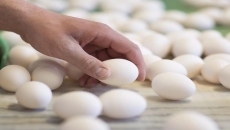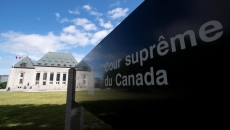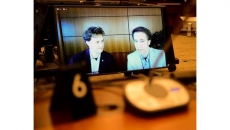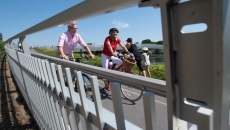Quebec is reducing the mandatory isolation period required for people infected with COVID-19 from 14 days to 10.
The change was made in response to evolving science regarding the transmission and the duration of contagiousness of the novel coronavirus, the Health Department said Friday in a news release.
From now on, people can end their isolation period 10 days after their first symptoms appear, or 10 days after testing positive for COVID-19 if they don't show symptoms.
Authorities added, however, that people must also meet other criteria to end their isolation after 10 days, including having no fever for at least 48 hours, and having no symptoms for at least a day — other than coughing or loss of taste.
"Once the isolation period ends, people are no longer considered contagious, but they must ensure to follow the guidelines that apply to the general population such as hand-washing, wearing face coverings and physical distancing," Public Health Director Horacio Arruda said in a statement.
The new rules apply only to confirmed COVID-19 cases involving people who are isolated at home and whose symptoms are considered mild or moderate. People who are in preventive isolation due to being in contact with a confirmed case must still isolate for 14 days to see if symptoms develop.
Those who are immunocompromised or who require hospitalization for COVID-19 will still need to isolate for at least 14 days.
Speaking in Ottawa, Canada's chief public health officer said Friday the new directive in Quebec aligns with existing federal guidelines regarding isolation that have already been adopted by several other jurisdictions.
"Our recommendation is, based on the evolving science, those who have experienced 10 days post onset of symptoms, asymptomatic, no fever, can come out of the actual isolation," Dr. Theresa Tam said.
She said that out of caution, some provinces including Quebec chose to impose the same 14-day period that is required for people who are quarantining to see if symptoms develop.
B.C. and Alberta have already been using the 10-day minimum period for self-isolation, according to their respective Health Department websites. New Brunswick, Nova Scotia and Newfoundland require 14 days, as does Ontario, according to the website for Ottawa's public health department.
The new isolation rules for Quebec come as more than 20 teachers from a high school northwest of Montreal were sent into preventive isolation, forcing the school to ask some 500 Grade 10 and 11 students to stay home Friday because there was no one available to teach them.
Spokeswoman Anik Gagnon said the decision was made after two members of the teaching staff at Polyvalente Deux-Montagnes tested positive for COVID-19 prior to the first day of classes.
She said the students were asked to stay home until Monday while the school tries to recruit substitute teachers or explores other options to overcome the lack of personnel. The 20 teachers will be in isolation until Sept 4, and will all be tested for COVID-19.
Sylvain Mallette, president of a federation of teachers' unions, the Federation autonome de l'enseignement, says the incident highlights the need for schools to have access to an accelerated testing process.
"The question is, how long did it take to get access to a test, and how long to get the results of the test?" Mallette said in an interview Friday. He said the Quebec government hasn't followed through on a promise to offer teachers quicker access to tests and to results.
Meanwhile, Quebec reported 98 new cases of COVID-19 Friday and one additional death attributed to the novel coronavirus.
The number of total deaths remained stable, however, at 5,750, following an investigation that showed one previous death attributed to COVID-19 was found to be unrelated.
Health authorities also announced Friday that 78 test results were confirmed as false positives due to a contamination of samples in a Montreal lab. That's almost double the number of cases that were originally under investigation when news of the contamination was announced Wednesday.
Health officials said those cases would be gradually removed from the province's total case numbers, which stood at 62,124 on Friday.






